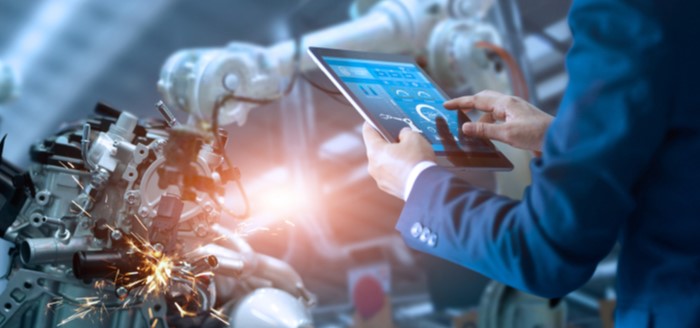We reside in a modern age where everything is developing. The term “monopoly” is fading in business, and anyone with the proper strategies and products can create profits. Companies can now use reliable techniques to accomplish higher business goals owing to AI’s advent into the market. Artificial intelligence gives startups a competitive advantage, while established corporations provide the framework for developing creative solutions.
Artificial intelligence is the most popular technology buzzword in today’s business world. This is because it aids in solving complicated business problems more humanistically. It is similar to taking aspects of human intelligence and converting them into computer-friendly algorithms. As a result, AI technologies are becoming increasingly essential to maintain a competitive edge.
What is AI in Manufacturing?
Artificial intelligence in manufacturing industry involves automating complicated tasks using technology and discovering previously unidentified patterns in manufacturing processes or workflows. Manufacturers can monitor their operations in real-time using Industry 4.0 technologies, which include machine learning, automation, advanced and predictive analytics, and IoT (Internet of Things).
Artificial intelligence is the most effective option in manufacturing facilities where the data collected from numerous sensors, software, and IoT-driven systems may be too complicated for humans to evaluate. Therefore, governments in India, Singapore, China, and Japan are investing in AI technology and promoting artificial intelligence applications in manufacturing. In addition, the manufacturing industry and startups are encouraged to utilize cutting-edge technologies like AI due to the Indian government’s Make in India initiative.
Prominent Use Cases of Artificial Intelligence in the Manufacturing Industry
Manufacturers will keep investing in technologies like AI and ML to reduce production costs and speed up the time to market. In addition, manufacturers will work to boost their businesses’ strength in the aftermath of a pandemic by using technologies that automate processes, identify disruptions, and provide end-to-end management of all operations.
The uses of artificial intelligence in the manufacturing industry are incredible. The AI manufacturing solutions provide insights into the appropriate design. Let’s explore some AI use cases in the manufacturing industry to understand better what you can do to keep your business innovative.
Quality Controls
It is among the best AI use cases in the manufacturing sector. Equipment internal problems can be challenging to identify. By observing the functionality of products, experts are sometimes unable to find their weaknesses. Minor defects in machinery can also be easily found using AI techniques, systems, and applications. Hence, AI in the manufacturing industry ensures quality control. Smart AI solutions monitor machine productivity, identify problems, increase performance, and lower maintenance costs.
Supply Chain Optimization
In supply chain operations, AI technology is gaining traction. Manufacturers can assess multiple scenarios (in terms of time, cost, and revenue) with the help of AI-enabled tools to enhance last-mile deliveries. In addition to using historical data, AI can predict the best delivery routes, monitor driver performance in real time, and analyze weather and traffic reports. From inventory management to material loading and delivery, IoT sensors are assisting manufacturers in better coordinating the whole supply chain.
For instance, Rolls Royce powers its fleet of self-driving ships using cutting-edge machine learning algorithms and image recognition, improving its supply chain’s efficiency and ensuring its cargo’s security.
Logistics
The losses resulting from either overstocking or understocking inventories are a recurring problem for manufacturers. Overstocking frequently results in failure and lower profits. On the other hand, sales, revenue, and customer losses can result from understocking.
With AI, manufacturers can:
- Monitor the activities on the production floor.
- Boost growth forecasting accuracy
- Reduce inventory losses and make resource management easier
Manufacturers can build serial parts internally or at nearby facilities using technologies like 3D printing, minimizing their reliance on distant, low-cost manufacturing sites and improving their inventory management.
AI Robots
AI robots use ML algorithms to automate repetitive and decision-making operations in manufacturing plants. These algorithms are self-learning, so they keep improving. They’re less prone to mistakes than humans. Consequently, manufacturers can grow their production capacity quickly.
Many manufacturers are already using robots to manage car assembly lines in the automotive sector. Robots are a faster and less error-prone replacement for humans in e-commerce and packaging. Additional uses include:
- Welding
- Painting
- Drilling
- Product testing
- Die Casting
- Grinding
Robots can perform labor-intensive tasks on the production floor while humans handle the more delicate ones. As a result, it enhances both overall production efficiency and workplace safety.
Predicts Component Failure
The most typical application of AI and ML in manufacturing is to increase machinery effectiveness. Sudden equipment failures are a challenge for manufacturers. A product can appear perfect on the outside, but when used, it performs ineffectively. It affects productivity. Best-in-class robotic solutions and predictive maintenance systems that provide early warnings of equipment faults and prevent unintentional machinery shutdowns are being developed by AI development businesses by leveraging the capabilities of AI, ML, and predictive analytics technologies.
IT Operations
AIOps, usually AI for IT operations, are essential for streamlining IT operations. Big data and machine learning are used in AIOps to automate IT operations activities. Automating extensive data management is the primary use case for AIOps. It would entail:
- Data gathering and integration from factory sensors and equipment.
- Monitoring and tracking the shop floor in real-time while measuring performance to specified standards.
- Identifying, predicting, and preventing IT service issues with predictive analytics as well as doing precise capacity planning.
- utilizing big data analytics to monitor and enhance resource usage and cloud infrastructure performance.
Predictive Maintenance for Equipment
Device manufacturers can reduce maintenance and repair costs by using predictive maintenance. Artificial Intelligence in the manufacturing industry can forecast when equipment needs care using ML-powered predictive solutions.
Likewise, cloud and IoT sensors are essential in modernizing the manufacturing business. Artificial intelligence applications in manufacturing are taught to look for patterns in the data on device performance gathered from connected IoT sensors. Such insights assist manufacturers in understanding the functionality of specific devices. Also, it can help businesses forecast the inevitable equipment failures that will occur in the future.
Digital Twins
AI provides endless benefits to the manufacturing sector. One of the AI advancements in the manufacturing industry is the digital twin. The virtual environment of the complete manufacturing infrastructure is referred to as the “digital twin.” Manufacturers can digitally manage equipment and monitor the production environment at all times. Furthermore, digital twin solutions enable manufacturers to virtualize and improve final product designs. Designing and testing equipment virtually is the digital twin’s primary objective.
Customer Support
Artificial intelligence in manufacturing boosts sales, productivity, and business performance. Innovative artificial intelligence applications in manufacturing can quickly identify customer problems and offer customized solutions.
Let’s look at how AI services and solutions can improve customer service:
- Swiftness of response
- Customized experience
- Relationship improvements utilizing CRM (Customer Relationship Management) software
- Use customer data to make an informed decision
Process Automation
AI-powered tools can recognize and eliminate bottlenecks in production processes automatically. Such tools allow manufacturers to achieve factory performance across several regions. In addition, it will enable them to standardize and simplify workflows to build better manufacturing processes.
Process automation can also:
- Decrease cycle times
- Boost profits
- Enhance accuracy
- Improve workplace protection
- Expand employee confidence and productivity
RPA (robotic process automation) is another use case where robots independently conduct repeatable tasks on the shop floor. However, human intervention is needed when the robots encounter exceptions or anomalies. Similarly, robots can use computer vision to screen and review processes without human intervention
Therefore, integrating artificial intelligence into the manufacturing industry might produce incredible earnings for manufacturing firms shortly.
Warehouse Management
AI can automate numerous factors of warehouse operations. Since they gather facts in real-time, manufacturers can monitor their warehouses and plan their logistics better. Robots in warehouses can track, lift, move, and sort items, giving humans more strategic tasks and lowering workplace injuries. In addition, automatic quality management and inventory reduce warehouse management costs, increase productivity, and require fewer workers. It entitles manufacturers to improve sales and profit margins.
AI-based Product Development
Before starting production, AI-based product development enables manufacturers to create numerous simulations and test them using AR (augmented reality) and VR (virtual reality).
It allows manufacturers to:
- Decrease trial and error costs.
- Reduce time to market.
- Empower engineers to predict and avoid problems before your product hits the market.
- Simplifies maintenance and troubleshooting processes.
Manufacturers can enhance and accelerate innovation to develop new, more advanced products ahead of the competition. AI algorithms have a continuous feedback loop, improving with each iteration and helping build better products.
Purchase Price Variation
For manufacturers, changes in raw material costs can affect margins. Therefore, accurately estimating raw material costs and selecting the right supplier is a significant challenge.
Using dashboards driven by AI, manufacturers can monitor:
- Pitch, dimension, material type, or finishing characteristics of resources.
- Supplier attributes like country, brand, or performance information.
- With the aid of AI-powered algorithms, manufacturers can:
- Combine the appropriate product components needed for production.
- Determine a purchase price based on previous data and market trends.
- Create a benchmark for comparing prices between providers.
Cybersecurity
Manufacturers are the ones who suffer from cyberattacks the most because even a short production line shutdown can be expensive. IoT device proliferation will result in exponentially growing risks. Cyberattacks are especially likely to target smart manufacturing. Security for production facilities and risk detection techniques powered by AI can reduce threats. Manufacturers can detect attacks across cloud services and IoT devices using self-learning AI and surgically interrupt them in a few seconds. The system can inform the right teams to take immediate action to stop further damage.
Conclusion: Is Artificial Intelligence the Future of Manufacturing?
Yes. AI will be the manufacturing industry’s future. Due to growing market growth, the manufacturing industry is adopting new technologies such as AI, ML, and others. The Fourth Industrial Revolution is the modern era in which all manufacturing processes have undergone a rapid revolution. The way that products and services are now designed and produced has undoubtedly changed as a result of the adoption of AI-based technology.
Therefore, artificial intelligence in the manufacturing industry delivers process improvement, reduced overhead costs, and excellent productivity. It also enables manufacturers to make quick decisions and improve the quality of their customer service.
Learn more about AI virtual assistants for the manufacturing business. Utilizing our manufacturing-focused AI solutions can benefit your business.











Wonderful post! We will be linking to this great article on our site. Keep up the great writing
Very well presented. Every quote was awesome and thanks for sharing the content. Keep sharing and keep motivating others.
Good post! We will be linking to this particularly great post on our site. Keep up the great writing
Thank you for great article. I look forward to the continuation.
Comments are closed.